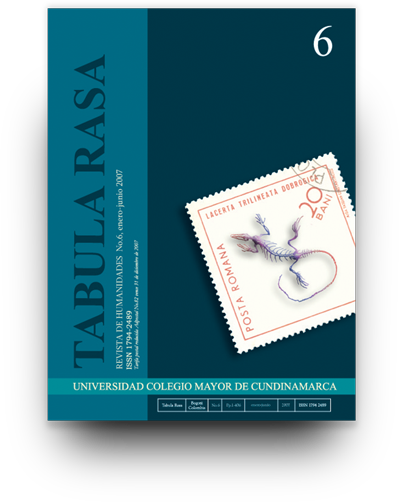Mostrar biografía de los autores
«Desarrollo» es la expansión económica adorándose a sí misma. Eso significa que necesitamos conocer el sistema de creencias que subyace bajo esa devoción, así como las características del campo de poder que la sustenta. La estructura y dinámica de cada campo de desarrollo están marcadas por diferentes capacidades de poder e intereses que son articulados a través de procesos históricos de estructuración de redes. «Desarrollo» abarca diferentes visiones y posiciones políticas variando desde el interés en la acumulación de poder económico y político hasta un énfasis en redistribución e igualdad. En consecuencia, son comunes las luchas de poder entre actores, en las instituciones y entre ellas. También se discute al desarrollo como ideología-utopía cuya pretensión universalista es problemática.
Visitas del artículo 177 | Visitas PDF 101
Descargas
Adams, Richard. 1967. The Second Sowing: Power And Secondary Development In Latin America. San Francisco: Chandler Publishing Company.
Appadurai, Arjun. 1990. “Disjuncture And Difference In The Global Cultural Economy”, en M. Featherstone (Comp.). Global Culture. 295-310. Londres: Sage Publications.
Barbosa, Lívia. 2001. Igualdade e meritocracia. A ética do desempenho nas sociedades modernas. Rio de Janeiro: Fundação Getúlio Vargas Editora.
Barros, Flávia. 1996. «Ambientalismo, globalização e novos atores sociais» Sociedade e Estado. XI(1):121-37.
Berman, Marshall. 1987. Tudo que é sólido desmancha no Ar. São Paulo: Companhia das Letras.
Binder, Leonard. 1986. “The Natural History of Development Theory” Comparative Studies in Society and History. 28:3-33.
Bourdieu, Pierre. 1983. A economia das trocas lingüísticas. São Paulo: Edusp.
Bourdieu, Pierre. 1986. Questions de sociologie. Paris, Editions de Minuit.
Dahl, Gudrun, y Anders Hjort. 1984. “Development as Message and Meaning” Ethnos.
49:165-85.
Davis, Shelton. 1988. “Indigenous Peoples, Environmental Protection and Sustainable
Development (a sustainable development occasional paper)”. International Union for Conservation of Nature and Natural Resources.
Delvaille, Jules. 1969. Essai sur l’histoire de l’idée de progrès jusqu’à la fin du XVIII siècle. Geneve: Slatkine Reprints.
DSA - Department of Social Anthropology. s.f. Development as ideology and folk model, a research programme of the department of social anthropology at the University of Stockholm.
Dodds, Eric. 1973. The Ancient Concept of Progress, and Other Essays on Greek Literature and Belief . Oxford: Oxford University Press.
Durkheim, Emile. 1968. Las formas elementales de la vida religiosa. Buenos Aires: Schapire.
Escobar, Arturo. 1995. Encountering Development: The Making and Unmaking of The Third World. Princeton: Princeton University Press.
Furtado, Celso. 1978. Criatividade e dependência na civilização industrial. Rio de Janeiro: Paz e Terra.
Goody, Jack. 1986. The Logic of Writing and The Organization of Society. Cambridge: Cambridge University Press.
Herzfeld, Michael. 1992. The Social Production of Indifference: Exploring the Symbolic Roots of Western Bureaucracy. Chicago: The University of Chicago Press.
International Work Group for Indigenous Affairs (IWGIA). 1989. Autodesarrollo indígena en las américas. Copenhagen: (IWGIA).
Jameson, Frederic. 1984. “Postmodernism, or the Cultural Logic of Late Capitalism”. New Left Review. 146:53-92.
Kraske, Jochen, et al. 1995. Bankers with a Mission: The Presidents of The World Bank, 1946-91. Oxford: Oxford University Press.
Kroeber, Alfred. 1955. “On Human Nature”. Southwestern Journal of Anthropology. 11:195-204.
Landes, David. 1983. Revolution in Time: Clocks and the Making of the Modern World. Cambridge: Harvard University Press.
Lévi-Strauss, Claude. 1980. Raça e história. Lisboa: Editorial Presença.
Mannheim, Karl. 1959. Ideology and Utopia. New York: Harvest Books.
Marsden, David. 1994. “Indigenous Management and the Management of Indigenous Knowledge” en S. Wright (Comp.). Anthropology of Organizations, 41-55. Londres: Routledge.
Maybury-Lewis, David. 1990. “Development and Human Rights: the Responsibility of the Anthropologist” Ponencia presentada en el seminário internacional sobre desenvolvimento e derechos humanos, Campinas, Abril.
Pareschi, Carolina. 2001. PD/A e PP-G7: construindo modelos de ação e interação do desenvolvimento
sustentável. (Inédito).
Perrot, Marie-Dominique, et al. 1992. La mythologie programmée: L’économie des croyances dans la société moderne. Paris: Presses Universitaires de France.
Ribeiro, Gustavo Lins. 2003. Postimperialismo. Barcelona, Gedisa.
Ribeiro, Gustavo Lins. 1999. Capitalismo transnacional y política hidroenergética en la Argentina. La represa hidroeléctrica de yacyretá. Posadas: Editorial de la Universidad Nacional de Misiones.
Ribeiro, Gustavo Lins. 1998. “Cybercultural Politics: Political Activism at a Distance
in a Transnational World” en S. Álvarez, E. Dagnino y A. Escobar (Comp.). Cultures of Politics/Politics of Culture: Revisioning Latin American Social Movements. 325-352. Boulder: Westview Press.
Ribeiro, Gustavo Lins. 1995. “Ethnic Segmentation of the Labour Market and the ‘Work Site Animal’: Fragmentation and Reconstruction of Identities within the World System” en J. Schneider y R. Rapp (Comp.), Uncovering Hidden Histories. 336-350. Berkeley: University of California Press.
Ribeiro, Gustavo Lins. 1994. Transnational Capitalism and Hydropolitics in Argentina. Gainesville: University of Florida Press.
Ribeiro, Gustavo Lins. 1992. “Environmentalism and Sustainable Development: Ideology and Utopia in the Late Twentieth Century” Environment, Development and Reproduction. Research Texts 2. Rio de Janeiro: Instituto de Estudos da Religião-ISER.
Ribeiro, Gustavo Lins. 1987. «¿Cuanto más grande mejor? proyectos de gran escala: una forma de producción vinculada a la expansión de sistemas económicos» en Desarrollo Económico, 105:3-27.
Rich, Bruce. 1994. Mortgaging the Earth: The World Bank, Environmental Impoverishment, and the Crisis of Development. Boston: Beacon Press.
Ricoeur, Paul. 1986. Lectures on Ideology and Utopia. New York: Columbia University Press.
Rist, Gilbert.1997. The History of Development: From Western Origins to Global Faith. London: Zed Books.
Said, Edward. 1994. Culture and Imperialism. New York: Alfred A. Knopf.
Stavenhagen, Rodolfo. 1985. «Etnodesenvolvimento: uma dimensão ignorada no pensamento desenvolvimentista» Anuário Antropológico, 84:11-44.
Steward, Julian. 1972. Theory of Culture Change: the Methodology of Multilinear Evolution. Chicago: University of Illinois Press.
Weber, Max. 1977. «Sociología de la dominación». Economía y sociedad. 695-1117 Mexico, Fondo de Cultura Económica.
Wolf, Eric R. 2001a. “Kinship, Friendship, and Patron-Client Relations in Complex Societies” Pathways of Power: Building Anthropology of the Modern World. 166-183. Berkeley: University of California Press.
Wolf, Eric R. 2001b. “Aspects of Group Relations in a Complex Society: Mexico” Pathways of Power: Building an Anthropology of the Modern World. 124-138. Berkeley: University of California Press.
Wolf, Eric R. 1999. Envisioning Power: Ideologies of Dominance and Crisis. Berkeley: University of Californ




